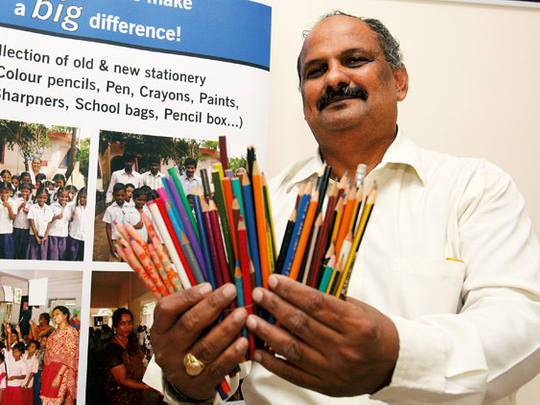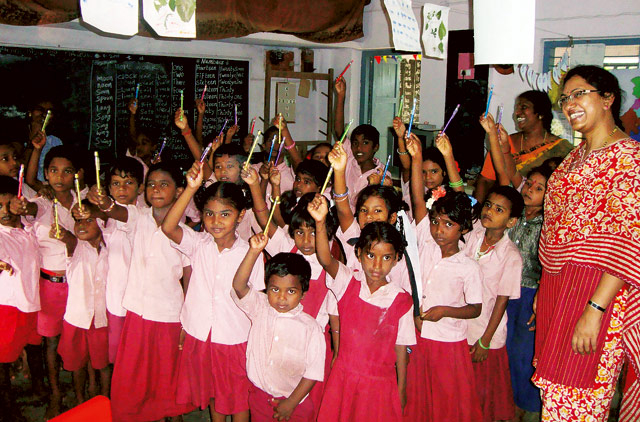
It's barely 7am but K Venkatraman is already in his Mahce Business Solutions office in Deira, Dubai. After making himself comfortable on the floor of the office where a few cartons are lying around haphazardly, he drags one close to him, fishes out a half-used pencil with its lead broken, then begins sharpening it. When he's satisfied it's perfect, he puts it to one side. Venkatraman repeats the process with all the pencils - around 100 of them - that are in the carton.
He then spends the next 20 minutes dividing up all the partially used colour pencils and crayons he has collected from various schools in Dubai. Next, he opens a brand new packet of erasers and pens he purchased at a sale and begins making goodie bags, each of which will include a couple of pencils, pens and erasers, a set of colour pencils and a box of crayons.
It's after 8am when he finishes making the packets - around 50 of them. He smiles contentedly. It's hardly the way most managing directors spend their first hour at work, but then Venkatraman isn't like most other businessman. His only concern first thing in the morning is making sure the packets are ready to be packed in a carton and sent off to be distributed to poor school children in Tiruvarur, his home village in Tamil Nadu in India.
"Every child needs a pencil and a book to learn. I am helping poor children take a small step in bridging this gap to education through my endeavour,'' says Venkatraman who, as well as running his own company, started a charity called Education4all, which has for the past three years collected used stationery and uniforms in the UAE and distributed them to the school children in India. "Through this initiative I want people to understand that what one person calls waste is another person's treasure,'' says the 53-year-old Indian expat, adding, "I love the early hours because the staff are not in as yet and I can do this work without being disturbed by visitors or phone calls.''
Giving the tools to learn
Venkatraman set up Education4all in 2009 to coordinate his charity efforts and to date has distributed more than 83,000 items of stationery to 2,440 children in over 50 schools in Tiruvarur. The items are inexpensive but his initiative has had a big impact on the school children's everyday lives.
"Most of them are children of farm workers who study in government schools that provide free education but not books or writing materials,'' he says. A large number of them are forced to drop out of school simply because their parents can't afford to buy them books, writing materials or even clothes, which for an average student in a village can cost around Rs3,000 (Dh240) a year.
"The goodie bag doesn't cost much - around Dh10 each if one were to buy all the stuff. But it means so much to these children, it literally gives them the tools to write and learn."
Venkatraman spends the majority of his spare time collecting materials for the goodie bags and says local children are eager to help.
"I give talks at various schools in Dubai including Our Own English High School, Westminster and Winchester where I encourage students to collect these items," he says. "Then I return to the school maybe a month or two later and pick up the stuff the children have collected. I get them to my office, sort them, clean and sharpen pencils, discard ones kids may not be able to use, then make goodie bags for the kids and send them to my friend Raghavan in Tamil Nadu, who distributes the stuff to needy schools in the villages.''
Each day as the collections grew so did Venkatraman's resolve to do more for children and society. Always on the lookout for novel ideas to help others, he and Raghavan, a philanthropist who runs a free school for underprivileged children in Arasavanangadu also in Tiruvarur district of Tamil Nadu, started another project called ‘Gift a cow' in 2010. As part of this project individuals can contribute money towards purchasing a cow, which is given away to a poor family. In rural India, owning a cow - which could cost anything between Rs25,000 (Dh1,657) and Rs50,000 (Dh3,314) depending on the breed - ensures a better quality of life.
"A reasonably good breed can be purchased for Rs25,000. It would provide around six litres of milk which the family can sell at Rs20 (Dh1.3) a litre. The daily extra income of Rs120 (Dh8) can offer a better life for the people. Part of the milk can also be used for the family's dietary needs.
"The milk is sold to the school Raghavan runs which uses it to prepare porridge that is given as a meal to the students free of cost. For the students, who rarely get three proper meals a day, this meal not only helps improve their health but also acts as a bait to encourage them to attend school,'' he says.
Venkatraman donated a cow in 2010 during his visit to Arasavanangadu, a neighbouring village. To date ten cows have been sponsored as part of the scheme.
How it all started
It was Raghavan who was responsible for igniting the first spark of this charity project. "The turning point happened on my 50th birthday on June 21, 2009,'' says Venkatraman, who has been in Dubai 20 years.
"Raghavan and his wife Aruna visited us. They, along with seven students from Tamil Nadu were on their way back from an educational trip to Scotland, which Raghavan had paid for. It was a great opportunity for us to interact with these children who came from impoverished backgrounds."
For two days Venkatraman and his wife Neela, who is also his business partner, played host to the seven students. As a parting gift they wanted to give the children a few presents. Venkatraman also wanted to handover the large number of crayons and pencils which his own children - now grown up - had used at school.
"Apart from some leftover pencils and writing material there were also several packets of unopened pencils and crayons. I showed them to Raghavan and asked him if they would be of any use to his students.
"To my surprise he said, ‘it would be a luxury for them. The kids in the village barely have any stationery to use and they'd be overjoyed to get these pencils and crayons.'"
That comment triggered an idea. "At that very moment I decided to do something special for less fortunate students.''
As soon as his friend returned to India, Venkatraman set to work. He dashed off emails to all his friends and acquaintances informing them that he was collecting pencils and writing material for poor children in India.
"The response was very encouraging,'' he recalls. Within a few days people stopped by his office and home to drop off over 1,000 pencils.
"I then set up a website www.education4all.com to get more people to donate their used writing materials. I also set myself a target of collecting 10,000 pencils. It's important to have some target when starting a project and I felt it would make me set the bar higher once I achieved it. Then thanks to a small feature on my initiative in Friday in 2009, several people joined hands with me and in about a month schools, students, teachers and housewives called to say that they had begun a collection drive for the initiative.''
Venkatraman soon started getting calls from students in senior classes who wanted to carry out pencil collection drives as part of their school projects.
These students made posters urging other students to contribute their used and unused stationery items. "There was an overwhelming response," he says.
At the end of this initiative Cambridge High School collected 5,000 pencils and other stationery items, Dubai International Academy collected around 5,000 pencils and English College, Dubai collected around 1,000 pencils. Readers of Gulf News contributed 2,000 items and corporate organisations contributed 5,000 items.
Over the years more organisations joined the fray. "The used pencils in fact serve a two-fold purpose - while helping educate poor students it is also an environment-friendly activity as it reduces the number of trees being cut to make pencils,'' he says.
Along with stationery items, with time Venkatraman also started collecting uniforms from schools. This initiative too received a huge response from the schools with Our Own English High School, Dubai collecting 1,450 pieces and Westminster School collecting 1,000 pieces.
Venkatraman is proud that his initiative is reaping benefits for children in rural areas.
"I would like more people to join this initiative,'' he says. "After all, I firmly believe that the best gift one can give children is a good education and if we can help make it better for them, there's nothing like it.''
Making a difference
- Who: K Venkatraman
- Where: Dubai
- What: An initiative to supply school stationery to poor children in rural areas of IndiaHow: Through his charity Education4all












